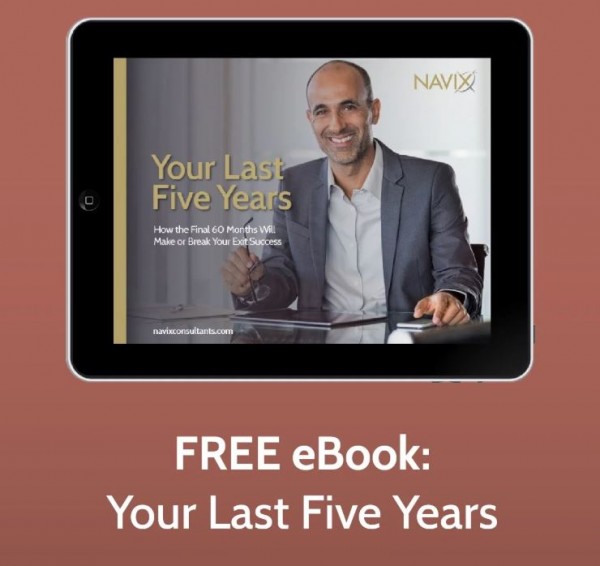
Archive for April, 2019
101 Questions to Help Business Owners Determine What to Do After Exit

By: Patrick Ungashick
Figuring out what you want to do after you exit from your company is a crucial step to exiting successfully and happily.
Many business owners have heard stories or know another owner first-hand who exited only to realize he or she was bored, frustrated, and regretted the decision to leave behind the daily challenges and sense of purpose that comes with owning and leading a company.
It will not matter how much money you have in the bank after you exit if you wake up every day lacking something meaningful and relevant to do with your time and talent.
Yet too many owners do not know what they are going to do after exit. Or, just as dangerously, some owners assume they know but have not tested their assumption by trying the activity in real life for any meaningful period of time.
Have a Clear Vision for Your Exist
Before you exit, you should have a clear vision for what you are going to do next and should verify that plan by actually trying the activity or endeavor. Once you exit, you cannot go back.
The following list of 101 brainstorming questions will help owners research and reflect on what to do with their time and talent after exiting from their business. Go through the questions, either on your own or with your spouse or a trusted advisor. (Spouses may consider answering selected questions as a couple, if helpful.)
Answer only those questions that prove helpful. Write down your answers and keep them for reference. Consider doing this exercise several times as exit draws near because your answers may evolve
1. What did I want to be when growing up?
2. What drives me?
3. Do I live exactly where I want to live?
4. Is there a cause in which I would like to be involved? What about that cause interests me?
5. What would I change most about my community?
6. Do I have dreams that I have not yet accomplished?
7. Do I spend my time and talent doing what I most want to do?
8. What do I want more of in life?
9. What do I want less of in life?
10. Over the next five years, what do I really want to do?
11. Who is the happiest person I know? What makes him or her so happy?
12. What is my personal mission?
13. What would I attempt if I knew that I would not fail?
14. Who are three people in my life who could help me achieve my dreams and goals?
15. What are the things I have most wanted to do during the last five years but have not yet done?
16. What are my greatest talents?
17. What have I always wanted to be great at? If I am not there yet, what has stopped me?
18. What are the important lessons I learned in business?
19. Over the last five years, what have I wanted to change about my business and my role in it?
20. What activities make me lose track of time?
21. What makes me feel great about myself?
22. What are my core values?
23. What do other people often ask me to help them with?
24. If I had to teach something, what would it be?
25. What are some of the biggest challenges I have overcome in life? In my business?
26. If I could share a message with a large group of people, who would they be? What would I say?
27. What are the important lessons I learned in business? List them.
28. What adjectives would people who know me use to describe me?
29. What am I known for?
30. What activities do I enjoy so much that I never tire of them?
31. What would I have done differently in my career?
32. If I could test drive three different jobs, what would they be?
33. What important lessons about myself have I learned from my failures and mistakes?
34. Is there anything in my life that feels unfinished?
35. What sayings, quotes, or mottos do I often turn to for guidance?
36. Who do I most enjoy serving?
37. What do other people see in me that I do not?
38. What is the world calling me to take on?
39. What did I most enjoy doing as a child?
40. What do I dislike about today’s society?
41. How do I introduce myself to other people?
42. If I had to repeat my career as a business owner, what would I absolutely not change?
43. If could swap my business for a different one, which would I swap it for? Why?
44. What dreams have I deferred in order to attend to my business?
45. What personal qualities have I most developed through owning a business?
46. What have been my biggest challenges as a business owner and leader?
47. How do my employees perceive me?
48. How do my peers perceive me?
49. What is the difference to me between living and existing?
50. What are my greatest life accomplishments?
51. What am I most thankful for in my life? In my business?
52. Who am I most thankful for in my life? In my business?
53. What is/are the greatest gift(s) another person(s) has ever given me?
54. What is/are the greatest gift(s) that I have ever given to somebody?
55. When was the last time that I did something for the first time?
56. Do I “go” through life or “grow” through life?
57. What skill do I most want to master?
58. What am I passionate about?
59. What have I always wanted to do but have never done?
60. If I had to donate a half-day per week of my time, to whom or what would I give it to?
61. What do I most enjoy giving to others?
62. What does success look like to me?
63. Over the last five years, what I have most enjoyed doing outside of my business?
64. What skills or attributes do I have that most contributed to my business success?
65. If I had no fear, what would I do after exit?
66. What interest or passion am I afraid to admit that I have?
67. If I could spend my time doing anything at all, what would I do?
68. How would I like to make the world a better place?
69. What would I regret on my deathbed if I had not done it?
70. What bores me?
71. At what time in my recent past have I felt the most passionate and alive?
72. What makes me excited to get out of bed in the morning?
73. What is it that I know deep down inside that I can do as well as anybody?
74. What is it that I do with ease?
75. Who are three people who taught me something worthwhile? What did each of them teach me?
76. What do other people often thank me for?
77. What about me typically earns the most compliments from other people?
78. What types of people do I most like to be around?
79. What have I most enjoyed about owning a business?
80. What have I least enjoyed about owning a business?
81. What topics do I like to read about?
82. What recurring dreams do I have?
83. What would I be doing if I absolutely, 100%, did not care about what other people think?
84. What is on my bucket list?
85. What am I world-class at doing?
86. What drives me?
87. What frustrates me?
88. What do I resent doing?
89. When I need help, how comfortable am I asking for it?
90. What would I do if I had one billion dollars?
91. What makes me feel great about myself?
92. What am I naturally good at?
93. What has been my greatest joy as a business owner and leader?
94. What do people need that I enjoy providing?
95. What would I stand for if I knew nobody would judge me?
96. What does a perfect day for me look like?
97. If I had to go back to school tomorrow, what would I major in?
98. If I could be the most influential person in the world, what would I change?
99. Which of these questions have stayed with me? Why?
100. Who should I share my answers with?
101. What do I need to do next?
Exiting happily requires more than just selling your company for top dollar. It also requires having a solid plan for what you want to do next in life that is engaging, rewarding, and meaningful. Use these questions as a starting point, and let us know if we can be of further assistance.
Schedule a 45-minute consultation to see how you can achieve a financially rewarding exit.
Contact Tim for a complimentary consultation: 772-221-4499 or email.
Do You Really Need an Audit as Part of Your Exit Planning?

By: Patrick Ungashick
One of the most common questions business owners ask us as we help them prepare for exit is, “Do I need to get audited financial statements?” It’s an important question because the wrong answer can lead to wasted money, greater risk of your exit falling through, or both.
Compiled
With compiled statements, your accountants collect your company’s data and organize it into financial statements that meet your specifications and commonly-held accounting standards and principles. Your accountants neither analyze nor verify the data with a compilation. As a result, the accountants provide no assurances on the data’s accuracy.
Reviewed
A review provides limited assurance on your company’s financial statements. During a review, the outside accounting team will examine selected portions of your company’s data and make limited inquiries related to the accounting practices and principles used by the business.
The accountants also may analyze certain figures, such as current-year and prior-year balances, to verify they meet expectations. In this way, a review can provide limited assurance about the company’s financial statements, but not to the same degree as a full audit.
Audited
An audit provides the highest level of assurance of a company’s financial statement accuracy. An audit explicitly states that the company’s financial statements are free of material misstatement or fraud and conform to generally accepted accounting principles.
In an audit, the accountants will obtain evidence of the financial data’s accuracy by thoroughly examining source documents, meeting with company management, and verifying information from important parties such as customers, vendors, and lenders. Then the accountants will rigorously test the data to verify accuracy in the final financial statements.
Audited financials require the most work and thus cost the most money, but they provide the highest level of assurance to creditors or buyers.
Do You Need an Audit?
Now we can explore if you need to invest in audited financial statements as part of your exit planning. The first step to answer this question is to know your likeliest exit strategy.
There are only four ways to exit your business: sell to an outside buyer, sell to an inside buyer (typically one or more key employees), pass it to family, or shut it down. Knowing which of these four will be your exit strategy goes a long way in determining if you need an audit.
If you intend to pass your business to family or shut your business down, rarely would you need to invest in an audit. That leaves the remaining two exit strategies of selling to an inside buyer or selling to an outside buyer.
If you intend to sell to an inside buyer, then typically you will not need an audit as long as a large portion of the sale will be financed by you, the seller. However, you may need an audit if you intend to bring in significant amounts of outside debt or equity to help finance the sale to your inside buyer, as lenders or investors may want assurances that an audit creates. (Ask us how to do this.)
So, if you intend to sell to an inside buyer, you might need an audit, depending on how you structure the deal. Therefore, you have to plan ahead.
The fourth possible exit strategy is to sell to an outside buyer. Under this strategy, you will typically want to invest in the audit prior to selling the company. Most outside buyers including strategic buyers and financial buyers will finance some portion of the deal, and their lenders will prefer or outright require the audit.
However, there’s more than just the buyer’s requirements to consider. It helps to look at the audit as an investment, not as an expense. Audited financial statements may help your company command a higher sale price and/or receive a greater portion of cash paid at closing.
Additionally, an audit may shorten a buyer’s due diligence period, which saves time and money and reduces deal risk for you. (Ask us how an audit reduces deal risk.)
Meet with Your Tax and Exit Advisors
Ultimately, there is no one-size-fits-all answer, but the above information should help you get started in the right direction. You must meet with your tax and exit advisors to discuss this question and determine your best course of action — ideally several years before you plan on exiting, because many outside buyers prefer to see three years or more of audited historical statements.
Knowing the right answer to this question will likely save money, time, and energy. A wrong answer, or waiting too long to answer the question, can derail your exit success.
What to know how all of this applies to you?
Schedule a 45-minute consultation to see how you can achieve a financially rewarding exit.
Contact Tim for a complimentary consultation: 772-221-4499 or email.
Why Every Business Owner Needs an Exit plan
Are you ready to exit your business?
Many business owners are ready to hand over the day-to-day responsibilities of running a company. Far fewer have done the necessary preparation to ensure they can leave their business with financial freedom and a secure legacy. That type of readiness comes from an exit plan.
Despite being of critical importance to every business owner, a fair amount of confusion exists around exit plans and exit planning. Often the term exit plan is used synonymously with exit strategy. While the two work in conjunction to achieve the same goal, they are distinct from one another.
Even more concerning is the confusion between exit plans and succession plans, which serve different purposes and benefit different parties.
13 Things That Will Kill Your Exit Happiness

We believe business owners deserve to exit happily. After all, what is the purpose of working as hard as you do if you never manage to reach your business and personal goals at exit?
Exit impacts nearly every area of a business owner’s life. Failing to exit happily one day could ruin a lifetime of dedicated work and sacrifice. Therefore, it helps to know the most common reasons why owners fall short of exit happiness.
Let’s call these the Happiness Killers, and these are the 13 Happiness Killers you should know about.
1. Failing to reach financial freedom. It’s not enough to exit the company and sell for a good price or maximize value. The more important question is, are you financially free after exit? If you exit but come up short of financial freedom, you may find yourself regretting having exited at all.
2. Getting too little cash at closing. It’s natural to fixate on the total price you expect to receive when selling the company. However, just as important as total price is how much cash you get at closing. Any dollars that you do not receive at closing are dollars you might never see. If you never receive those dollars, you could end up exiting unhappily.
3. Working with (or for) people you don’t like or respect. Many owners keep working after exit with (or for) the company’s new owners/leaders. If you later learn that you do not like or respect these people, you may find yourself deeply unhappy. This is especially true if you did not reach financial freedom (see #1) and therefore cannot afford to just walk away from the situation.
4. Doing something that you don’t love. It does not matter how much money you have in the bank if you wake up every day facing doing something that you do not enjoy. As with the previous Happiness Killer, this can undermine your personal happiness regardless of how financially successful your exit may be.
5. Not knowing what you are going to do in life after exit. After exit, most owners search for something to do that provides the stimulating challenges and sense of identity that they enjoyed from running their companies. If you never find this, you may struggle to be happy after exit.
6. Feeling like your top people were mistreated. Your business’s value is undoubtedly rooted in its people. You likely will not be happy if your exit causes your people to unfairly lose their jobs or if it strands former employees in an inferior work environment.
7. Feeling like your customers are getting less value. An exit that significantly diminishes the quality of goods or services you had been providing customers is not a happy exit.
8. The exit breaks up relations between business partners. If you have business partners, you will probably care deeply about how they fare during your exit – and theirs. There are many ways that one partner’s exit can undermine another partner’s goals or plans. Partners who lack alignment regarding these issues often end up exiting unhappily.
9. Leaving before you wish to. Leaving your company before you want or intend is a Happiness Killer. You will likely feel as though somebody ripped your company away from you.
10. Sticking around longer than you want to. The opposite side of this issue is having to stay with the company any longer than you prefer after your exit. If you have other things you’d rather do and pursue, then being forced to stick around with the company will not be a happy exit.
11. Exit causing stress at home/in marriage. Exit brings massive change in an owner’s personal life and relationships, especially with your spouse or significant other. Many couples are caught off guard and find themselves disoriented in the post-exit world. Left unchecked, this can lead to regret and unhappiness.
12. Not leaving the company in good hands. If you exit the business only to realize later that the company’s new leaders are not competent to run the company and/or not equally committed to its success as you were, you may find yourself unhappy long after your exit.
13. Paying more taxes than you could have. Your exit will probably be the most expensive transaction in your life, with taxes comprising the largest line item costs in most situations. An excessive tax bill can undermine not only your nest egg but also your sense of fairness and satisfaction.
With so many exit Happiness Killers out there, it’s prudent and wise to evaluate which of these potential threats you have adequately addressed and which may still be in your future. Ask us how to do this. You are working too hard and have made too many sacrifices not to be sure that you are on the path to future exit happiness.

Download the eBook now.
Schedule a 45-minute consultation to see how you can achieve a financially rewarding exit.
Contact Tim for a complimentary consultation: 772-221-4499 or email.

 Tim is a Consultant to Business, Government and Not-for-Profits Organizations specializing in innovative and challenging ways for organizations to survive, to thrive and to build their teams.
Tim is a Consultant to Business, Government and Not-for-Profits Organizations specializing in innovative and challenging ways for organizations to survive, to thrive and to build their teams.